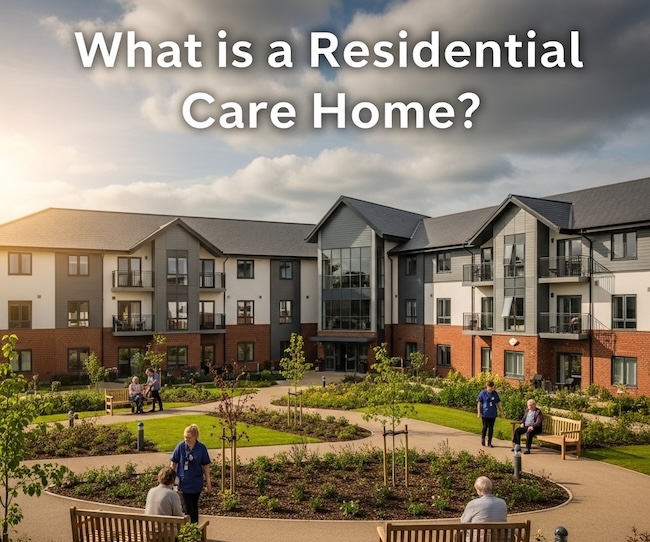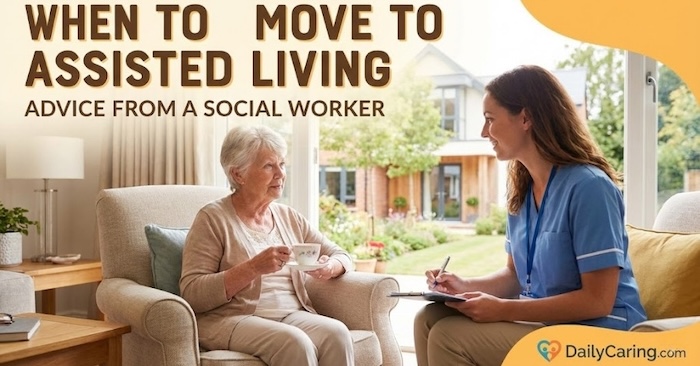When it comes to senior living options, assisted living facilities often dominate the conversation, but they’re not the only solution. Residential care homes provide a compelling middle ground for older adults who need more personalized care than independent living offers, yet don’t require the clinical environment of a nursing home.

Also known as adult care homes, these smaller, home-like facilities offer around-the-clock support, focusing on companionship, individualized attention, and a family-style atmosphere.
In this article, we’ll explore how residential care homes differ from traditional assisted living, who benefits most from them, and what to consider when evaluating this often-overlooked option. If you’re seeking a balance between independence and attentive care in a cozy setting, this alternative might be the perfect fit for your loved one.
What Is a Residential Care Home?
Assisted living communities aren’t the only housing option for an older adult who needs care.
Another option is a residential care home, also known as a board-and-care home or personal care home. In some areas, these facilities are also called “Adult Care Homes.”
These places provide care to small groups of adults aged 60 or older. In California, 90% of these homes have six or fewer residents.
Residential care homes are typically located in the middle of regular residential neighborhoods because private homes are usually converted and staffed for small-group living.
We explain the types of care a residential care home provides, how much they cost monthly, and who might enjoy living in this type of senior housing.
30% of families exploring senior living aren’t aware that residential care homes exist as an alternative to extensive assisted living facilities. – Genworth Financial 2022
VIDEO: WHAT IS A RESIDENTIAL CARE HOME?
What Kind of Care Is Provided By a Residential Care Home
A residential care home provides a higher level of care than assisted living, but a lower level than a nursing home (aka a skilled nursing facility).
The most significant difference is the more personalized care and staff attention, as each home typically has only 3-5 residents at a time.
Each home may also offer different services. Some provide a high level of care while others focus on the basics. It’s essential to find out from each place exactly what services they will and won’t provide.
Residential care homes typically offer:
- A single or double room (not an apartment)
- Shared bathroom
- Meals
- Housekeeping
- Personal care
Residential Care Homes provide supervision and help with activities of daily living, such as:
- Bathing
- Dressing and grooming
- Moving around
- Storing and distributing medication (but not administering)
- Toileting and incontinence care
Some residential care homes may also provide:
- Transportation
- Some level of medical services, like giving medication
What’s typically not provided by Residential Care Homes?
- Certain types of medical-level care, like tube feeding or treatment of open bedsores
- The level of amenities and recreational activities you'd typically find in an assisted living community
How Much Do Residential Care Homes Cost?
According to Genworth, residential care homes typically cost about the same as assisted living, on average $5,900/month.
However, costs will vary depending on the level of care needed, the quality of the home, and most importantly, its location.
One key difference is that a residential care home usually doesn’t accept Medicare or Medicaid.
They accept private payment, VA Aid & Attendance money, and long-term care insurance.
Small-scale senior care homes (with 4–25 beds) represent 15% of senior housing inventory but are often overlooked by families unfamiliar with this model – NIC Analytics, 2023
Who Would Enjoy Living in a Residential Care Home?
1. Seniors who dislike the larger, institutional-type living situation found in most assisted living communities
In a residential care home, your older adult can live an everyday life.
They can go shopping, have friends and family visit whenever they want, go for walks, dine out, etc.
It’s an excellent option for those who can’t live independently but hate being in a large institutional setting.
2. Seniors with Alzheimer’s disease or dementia
For people with Alzheimer’s disease or dementia, living in a smaller place with fewer people can reduce anxiety and stress.
They’ll also be able to get care from a few staff members who can get to know them and their specific needs.
Final Thoughts on Residential Care Homes for Seniors
Ultimately, choosing a residential care home is about finding a true home. This place offers not just medical support, but companionship, dignity, and the comfort of personalized care in a warm, family-style setting. It’s a solution that beautifully bridges the gap between independent living and the clinical feel of a large facility.
By considering this often-overlooked option, you are opening the door to a lifestyle where your loved one can feel truly known and cared for, and you both can enjoy the profound peace of mind that comes from finding the right fit.
Related Articles:
- 7 Senior Housing Options: Which One Works Best?
- How a Senior Living Advisor Helps Find Housing
- How to Pay for Assisted Living: 6 Options
About the Author

Connie is the founder of DailyCaring.com and was a hands-on caregiver for her grandmother for 20 years. (Grandma made it to 101 years old!) She knows how challenging, overwhelming, and all-consuming caring for an older adult can be. She also understands the importance of support, especially in the form of practical solutions, valuable resources, and self-care tips.














I need a residential care home for my mom .
I live in [xxxxx] area.
Each state has their own directory of licensed residential care homes. Try searching online for “residential care home” or “residential care facility” and the name of your state to find that state’s directory. That helps to make sure that any home you’re considering is properly licensed.
I need info for my sister iam her caregiver and it’s getting hard on and my health so my sister needs rehab and medical dont want nursing home been there done that looking into small place my sister is bed riden was having rehab but it stopped so needs her meals changed and rehab
Each state has their own directory of licensed residential care homes. Try searching online for “residential care home” or “residential care facility” and the name of your state to find that state’s directory. That helps to make sure that any home you’re considering is properly licensed.
Once you identify licensed residential care homes in your area, you’ll be able to contact them to find out what type of services they offer.
We hope you’ll find a great place for your sister so you’re able to take care of your health.
We are a family of Healthcare workers; I am an ICU RN, my wife is a CNA as is my sister-in-law that lives with us. My wife is somewhat disillusioned with the conditions and standards of living at the facilities in our area. We recently bought a large country home and have a master suite and 1 additional bedroom we are looking to use for Senior Living. We live in Arkansas and need some help with where to start on this. Can you point us to where to look for licensing information in our state?
It’s wonderful that you’re thinking of opening a residential care home! Each state’s licensing and operating requirements are different, so you’ll need to check with your state’s licensing organization. Use Google to search “residential care facility licensing [your state]” or a similar phrase and you should get a lot of listings directing you to your state’s licensing agency.
I am preparing to retire from teaching with the year. My 81 year old mother was diagnosed with Alzheimer’s 9 years ago and has been with me until just last year when we moved her to a memory care home. It’s a very nice (expensive) place, however, I feel she would be more comfortable in a smaller home. I am seriously considering opening a home for no more than 5 residents, but need help in the beginning/licensing stage. Any assistance on where to start would be greatly appreciated.
It’s great that you’re thinking of opening a residential care home. Each state’s licensing and operating requirements are different, so you’ll need to check with your state’s licensing organization. Use Google to search “residential care facility licensing [your state]” or a similar phrase and you should get a lot of listings directing you to your state’s licensing agency.
It would be more helpful if you could provide a link to residential care homes in each state.
Each state has separate licensing and requirements for residential care homes. Unfortunately, this means that there isn’t a comprehensive directory from an unbiased source that we can link to.
To find a residential care home in your area, check with your state’s senior housing licensing agency, use a senior living advisor (https://dailycaring.com/senior-housing-experts-help-seniors-find-the-perfect-place-to-live/), ask the local Area Agency on Aging for help (https://dailycaring.com/area-agency-on-aging-resources-for-seniors/), or use online referral services that have their own senior housing directories.
How long after you apply for group home license,can you start taking clients,I am looking for money now rent house,get started.
Each state’s licensing and operating requirements are different, so you’ll need to check with your state’s licensing organization.
It’s obvious only people with money are able to take care of their parents not everybody has money Medicaid Medicare doesn’t work for this type of thing don’t fool yourself
It’s very true that senior care and housing can be expensive. Medicare only covers short term stays in skilled nursing facilities after a hospitalization. But Medicaid does cover long term care services and support. There are ways to qualify for Medicaid, but it’s best to speak with a lawyer about the specific situation to find out if that’s possible.
These articles may help explain the options available for paying for care and housing:
— Medicare vs. Medicaid: What You Need to Know https://dailycaring.com/medicare-vs-medicaid-what-you-need-to-know/
— How to Pay for Assisted Living: 6 Options https://dailycaring.com/paying-for-assisted-living/
— How Medicaid Spend Down Helps Seniors Qualify for Long Term Care Benefits https://dailycaring.com/how-medicaid-spend-down-helps-seniors-qualify-for-long-term-care-benefits/
— 7 Sources of Free Legal Services for Seniors https://dailycaring.com/7-sources-of-free-legal-services-for-seniors/
This is not true, there are many good small group homes that take medicaid. NOBODY can take medicare as payment EVER! Most seniors have homes to sell to care for themselves as they age, but some don’t and a lot of homes are medicaid waiver approved. Please do you footwork.
I am looking for a place for my wife she suffers from Alzheimer’s she is 68 years old, I live in Yorktown Hights New York,I would like to find a place near me.
There are a variety of ways to find an assisted living or memory care community for your wife that’s near you.
You could search on major senior housing websites. Popular ones include:
— Caring.com
— APlaceforMom.com
— Seniorly.com
You could also hire an expert to help you search for the right place for your wife’s care needs and your budget:
— Senior housing experts (like specialized real estate agents) https://dailycaring.com/senior-housing-experts-help-seniors-find-the-perfect-place-to-live/
— Geriatric care managers https://dailycaring.com/when-hiring-a-geriatric-care-manager-makes-sense/
You could also contact your local Area Agency on Aging to see if they can give you any recommendations. More info on them here — https://dailycaring.com/local-community-resources-for-seniors-and-caregivers-area-agency-on-aging/
I was wondering if it is possible to volunteer here?
It’s great that you’d like to volunteer! I’d suggest calling residential care homes in your area to find out if they’re accepting volunteers.